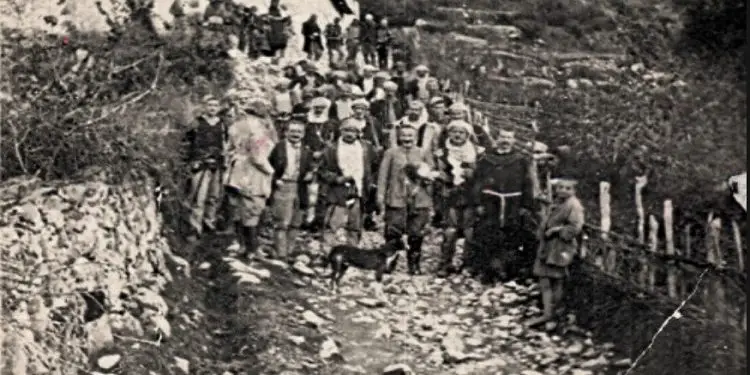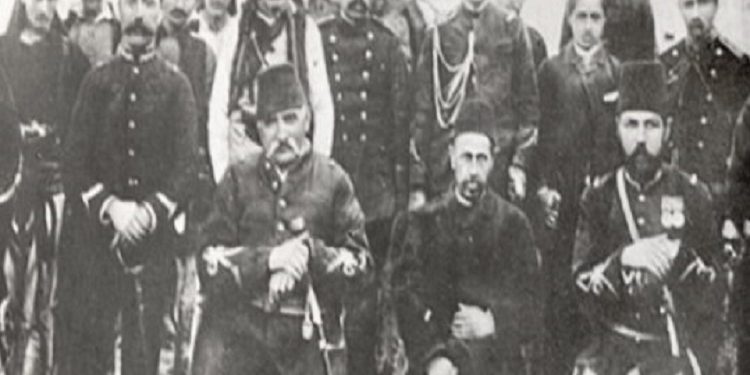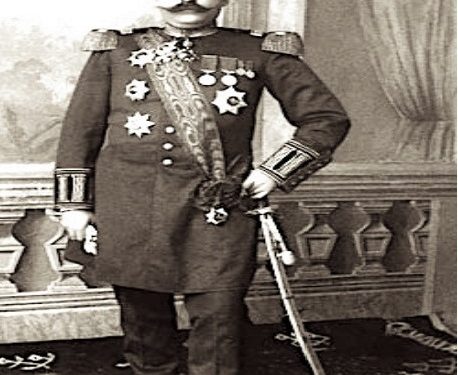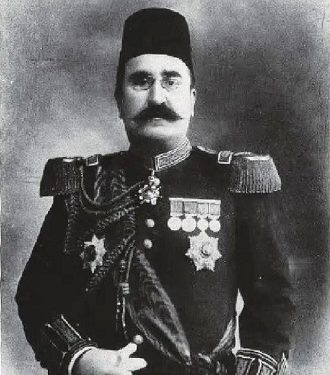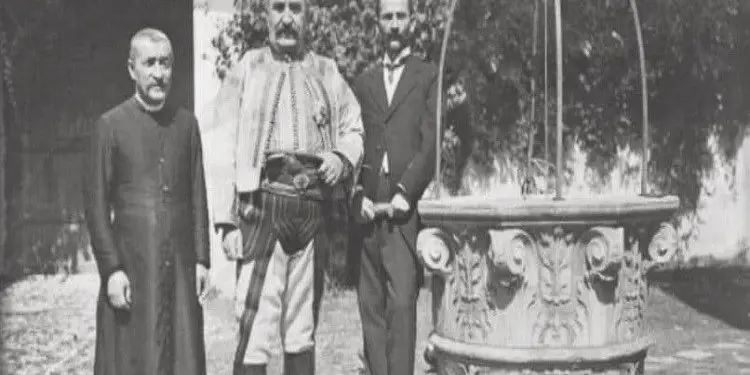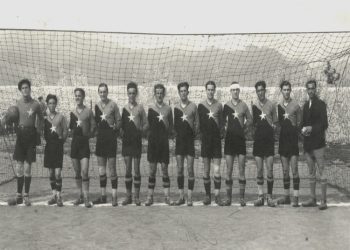By Dr. Nikol Loka
Part twenty-four
“PRENGA BIBE DODA, THE SHADOWS OF A CITIZENSHIP”
Memorie.al / The newest book “Prengë Bibë Doda, a phenomenon in Albanian political life”, by researcher Nikollë Loka, not only expands the scope of historical studies on Mirdita, the Door of Gjonmarkaj and the figure of the Mirdita Prince, Prengë Bibë Doda, but it is also a contribution to national historiography. The very rich archival material, the literature used or consulted, oral traditions, etc., make this book a real study treasure, giving the science of history a scientific monograph that enriches our knowledge of Mirdita, its captains, tradition, history etc. Studying such an important and complex figure, such as the figure of Prengë Biba Doda, is a high scientific responsibility that not everyone undertakes. Nikollë Loka, has done a great job of research and treatment by the professional researcher, giving us the portrait of the Prince and the general Mirditor, with the true contours. Dr. Loka has adhered to the end of the space and time, in which the multidimensional events and their protagonists have developed.
THE MONOGRAPH “ABOUT BIBË DODA, A PHENOMENON IN ALBANIAN POLITICAL LIFE”, A VALUABLE SCIENTIFIC STUDY THAT ENRICHS THE FUND OF OUR HISTORICAL STUDIES
(By Mr. Sc. Murat Ajvazi, March 2017, Switzerland)
Continues from last issue
“On September 7, 1913, an assembly was held in Lezhë to find the “Ray of Albania”. After the five bajraks of Mirdita, three of Kthella, four of Malësë Lezha, and Lezha with them, said that they wanted to let Prengë Bibi Doda know about Rzeze di Shqypnia. But Kurbini, Bregu i Mate, Zadrima and Puka answered them that they have nothing, Albania has no door, it’s in vain to search for its radius, and therefore they wanted to inform about a Prince, one man, so that Europe sign to rule Albania, the long way from the border of Montenegro, to Greece and from the border of Serbia, to the Adriatic Sea. As for His Excellency, Prengë Bibë Doda, they said that their hearts were satisfied, that you are a bright star in the aristocratic sky of Albania”. (489)
The objections were therefore immediate, since that natural request was misunderstood, as if; “Mirdita was seeking to impose herself on the other provinces through her Kapidan”. In the “Shqypnia e Re” newspaper, it is written about this case: “We have nothing to do with Lezhë, Puke and Kurbin, we have nothing to do with the Mirdites, because this is more than a beggar’s belief, that’s why we entered all those veins, where with blood for months now, we have founded and worked hard to preserve and have preserved the Future Government of Leshi”. (490)
As for the Prince, today is not the time to mention it; it is out of our hands. But the Prince of Albania cannot be Congolese, Austrian or Italian. As for Prenga Pasha, we remember that he does not even intend to do this job, not that he has not thought of it, nor can it come to his mind. It’s time to leave today some small work and these hassles, because we remember that I’m tired, and consider the bigger needs that Albania had from us. (491)
The Mirditas had felt bad about this attitude and had repeated that request, in an assembly of twelve Bajraks. In an assembly of 12 bajraks held in Orosh, it was requested that: “he be recognized as the Prince of Albania”. (492) Prenga’s entire “election campaign” took place while he was abroad. Like all other issues, the choice of the Prince was made by the internationals and was the result of compromises between them. For the choice of the Prince, the internal balance had to be kept in mind: provincial and religious divisions, as well as the interests of the Great Powers, which had decided on the creation of the Albanian state. No Albanian candidate could meet all the criteria. However, in the political environment of the time, there has been talk of the candidacy of the Prince of Mirdita. Nopça writes: “At this time, Prenk Bibë Doda, who traveled back and forth between Vienna and Rome, came to the fore.” (493)
Prengë Bibë Doda, who was registered as one of the forty-four contenders for the Royal Throne of Albania, but in the conditions when the Great Powers were looking for a King of foreign origin, Prengë’s chances of becoming King were few. As the regent of Albania, of course, a foreign prince had to be chosen, because due to the great political divisions, none of the local contenders had great influence beyond their provinces. The fever of the Albanian throne involved many political circles interested in Albania. Since March 1912, Ferdinand Bourbon-Orléans, Duke of Montpensier, had gone to Vlora on an English ship and announced his candidacy for the throne of Albania. Warmly welcomed by the Albanians, he left for Rome, Paris, Vienna and London, with Isa Boletini, to get support for the independence of Albania… (494)
The duke was related to the most important families that ruled Europe. Apart from Montpensier, among the claimants to the throne were Princes Maurizio, of Schaumburg-Lippè and Karl von Urach, (495) also, the Bonaparte family had three candidates: Princes Victor, Louis and Roland Bonaparte. Other contenders were the Germans: Mauricio Schonbourg-Lipe, Duke Karl von Urach, Prince Karl von Hohenzllern and Prince Wilhelm Friedrich Heinrich Von Wied; the Englishman Arthur of Connaught; the Swedes: Duke Vilhelm Soedermanland and Duke Karls Westgothland, as well as the Danish Prince Aksel. (496) From Austria-Hungary and from the Vatican, the candidacy of Duke Wilhelm Herzog von Urach was supported. However, this candidacy did not have the support of Italy, which, together with Russia, did not want a Catholic prince and, of course, no favors of Vienna, which would turn Albania into an Austrian protectorate. (497)
King Nicholas of Montenegro also had the hope of taking the Albanian throne, who kept in touch with some representatives of Northern Albania, who visited him in Cetina and, as a reward for the support they gave him, received money and weapons. (498) The High Gate, too, used all means to place a prince of the Ottoman Royal Court or, at least, another prince proposed by it, at the head of Albania. Of the four candidates proposed by Istanbul, Burhan Edin and Abdyl Mejit were members of the Ottoman dynasty. (499) Among the contenders who had Albanian origins or who were Albanians, we mention the Italian Marquis, Di Aluetta and the Spanish nobleman, Don Juan Aladro Castriota Perez Velasco. Another contender of Albanian origin was Prince Albert Gjika, who had support, mainly, among the Albanian colonies in Romania and Bulgaria. (500)
While the Minister of War of the Ottoman Empire, General Ahmet Izet Pasha, of Albanian origin from Manastir, and Ahmed Fuad Pasha, part of the royal dynasty of Mehmet Ali Pasha, were proposed by the High Gate. (501) Finally, after much pressure, the responsibility fell on Austria-Hungary and Italy, who chose Vilhelm Wid, a Protestant German prince, a foreigner who had nothing to do with Albanian strife and conjunctures. This choice became immediately popular. (502) With as much campaigning as he did and with as much support as he gained, Prengë Bibë Doda was able to register his name among the contenders for the Royal Throne of Albania, which had been discussed at the diplomatic tables of the Great Powers, certainly without any chance of winning .
Minister, in the two governments of Prince Vid
In the third week of December 1913, Ismail Qemali telegraphed the Archbishop of Shkodra, Monsignor Serreq, Abbot of Mirdita, Monsignor Prend Doçi, Prengë Biba Doda, etc., that Prince Vidi has been officially appointed by the Great Powers as Sovereign of Albania, and begs them to cooperate in choosing the delegation that will offer the crown to the Prince. (503)
It was a great event, if we consider that for the first time since the period of the Illyrians, the Albanians would have their own Kingdom, in their own independent state. In Albanian society, this news aroused natural optimism, while politicians also had dilemmas, whether they could become the favorites of the young Prince. In February 1914, Preng Bibë Doda together with Dom Ndoc Nikajt and Zef Skiroin, went to Brindizi and from there to Bari, where they intended to, together with other delegates, go to Vilhelm Vid’s house. A delegation, on behalf of the Albanian people, would hand over the crown of Albania to the Prince. (504)
The Albanian delegation was headed by Esad Pasha and was seen in political circles as an attempt to remove Pasha Toptanas from his path of disunity. The Control Commission gave Esad Pasha the only condition, to resign as the Chairman of the Government of Durrës, before the departure, and charged him to lead the representation that would offer the crown to the Prince. (505)
The Albanian delegation that went to Germany on February 21, 1914, consisted of prominent personalities of Albanian life, such as: Esad Pasha, Nikollë Kaçorri, Xhemil Bej Vlora, Spiro. G. Koleka, Jusuf Hamazaraj, Milto Shazivari, Shefqet Vërlaci, Lef Nosi, Ahmet Hastopalli, Ndoc Çoba, Pashko Kakarriqi, Sami Vrioni, Hysen Vrioni, Iljaz Vrioni, Abdyl Ypi, Mihal Turtulli, Eqrem Bej Libohova, Eqrem Bej Vlora and Hasan Prishtina . (506)
As you can see, Prengë Bibë Doda was missing from the delegation and it is very possible that this absence was his personal choice, since in all likelihood; he did not like the fact that that delegation would be led by Esad Pasha.
On February 12, Esad Pasha left Albania for his solemn mission, after having given a speech in praise of the Prince, saying: “I feel proud and happy, for the mission they have entrusted me with.” On February 21, Neuwied, a Prussian town on the Rhine, was decorated for the holiday, with a triumphal arch in front of the Wied Castle. The Prince greeted Esad Pasha, who through a speech, on behalf of the Albanian people, asked the Prince to accept the throne of “free and independent Albania”. Esad Pasha, had emphasized that; “The Albanian people were forced to fight fiercely for their freedom and have never forgotten their glorious past. The Albanian people have known how to keep the nationalist spirit and the language of the ancestors”. The head of the Albanian delegation guaranteed the Prince that; “Albanians have to be, without exception, loyal citizens of Your Majesty and always ready to help your work, to give Albania a better future” and ended the speech with the call; “Long live the King of Albania”! Vilhelm Vidi answered in German, accepting the throne of “the country that, after many struggles and difficulties, had managed to be free” and swore that he would work for the welfare of the Albanian people. After the arrival of the Prince, the Albanian state began to be recognized by other states. In the first year of the Kingdom, Romania, Italy, and Austria-Hungary changed their consuls into full-fledged ministers. (507)
In the two governments that Vidi created in Albania, Prenga was included in the government cabinet. In the first cabinet of Turhan Pasha, who was appointed Minister for World Affairs, but had not accepted that function and for weeks, had resisted the pressure not to accept the offered portfolio, until he finally withdrew from this venture and returned to Mirdita. (508)
The Prince of Mirdita was looking for a position of first importance in the cabinet, because he came from the position of Deputy Prime Minister of the Provisional Government. He withdrew with the understanding of the Government, pending the receipt of another portfolio. The newspaper “Shqipëria e Re” writes about the situation that was created with the opposition of Prengë Pasha, to get the promised post. “When Prengë Bibë Doda came to Durrës, Dr. Turtulli, the Minister of Education, had suggested that; as Minister of World Affairs; to engage with the drying of the marshes of Durrës; to start work as Minister from those. His Excellency, Prengë Bibi Doda, did not accept the wallet, as we all know, he returned it: His Excellency Dr. Turtulli, are you sleeping”?! (509)
Esad Pasha, within the cabinet, began work to undermine the Albanian state, in order to realize his ambition, to become “Prince of Albania”. Bibë Doda, had joined the plan to remove Esad Pasha from the Cabinet, with the promise that they would appoint him Governor of Shkodra. (510) On May 19, 1914, he was arrested. (511) the departure of Esad Pasha created the necessary space for the beginning of talks on the re-composition of the Government. On May 29, the new Government Cabinet was formed, where Turhan Pasha again held the post of Prime Minister, but handed over that of the Minister of Foreign Affairs to Prengë Bibë Doda. (512)
During this period, Prenga worked with flesh and soul, so that the country would go towards normality. The appointment of Biba Doda, at the head of foreign policy, was well received to the extent that; “The appointment of Prengë Biba Doda as Minister of Foreign Affairs has made a funny impression and it is emphasized that in Upper Albania, he has a great influence, after which everyone runs like a child after his father. He, at the time when the time came to show his power, became simple, loyal to King Vilhelm and Atma Sqypnië”. (513)
The governance during the period of King Vid was complicated by Italian, Russian and French intrigues, as well as by the tricks of their protectors, by the “immunity” enjoyed by Greece, for all its own machinations, but also by the “preserving the neutrality of” , from Germany and England, who made it impossible for Turhan Pasha to fulfill his duties and marked the fate of the short reign of the Hohenzollern family”. (514) On May 2, 1914, a new movement of the Young Turks began, led by Arif Hikmeti, as their exponent. For his part, he had started to make propaganda in Dibër, to proclaim a Turkish prince as the King of Albania. The propaganda of the people and in the Albanian political and intellectual circles, the newspaper “Shqypnia e Re”, writes Arif Hikmet, was accompanied by large sums of money. (515)
According to the data, 10,000 napoleons of gold had passed through the mail from Belgrade, for Arif Hikmet in Dibër, where he was to command an armed band of Serbs. He first collaborated with Beqir Grebene, then with the Serbs and then with Esad Pasha Toptan. (516) Arif Hikmeti was considered by the diplomatic circles of the time as a dangerous agitator, as he possessed a rare gift, eloquence, which enabled him to move the crowds of fanatics in any direction he chose. (517) In the outbreak of the uprising in Central Albania, pro-Young Turk agents have influenced, among whom should be mentioned; Musa Qazimi, Hamdi Rubejka, Qamil Haxhi Fejza, Mustafa Ndroqi and Haxhi Qamili, who first encouraged the exhausted and illiterate peasants of Central Albania. (518)
The newspaper “Dielli” wrote that: “This movement was nurtured by Turkey, helped by Serbo-Greece and spread by Italy. It grew out of the carelessness of the government, most of which was supported only by this propaganda and was compromised with the insurgents”. (519)
On January 7, 1914, the ship “Meran” would bring soldiers and officers equipped with Turkish passports, as Albanian traders and soldiers. They came to the Motherland, under the pretext that the war was over. The International Commission of Control, upon receiving the news, ordered that the Dutch officers, who were entrusted with the regulation of the gendarmerie and the police, to search the ship. After the search, a list with the names of 202 people, and a significant amount of gold and dynamite was found. After the discovery of this conspiracy, the 202 soldiers returned, on the same ship to Trieste, whiles the 6 officers, among them Beqir Grebeneja, known by the nickname Besim Elbasanli, Efendiu, were arrested and sentenced to death. (520) Turkey denied the accusations that it has a hand in this event, leaving its organization to non-governmental structures, however, the Austro-Hungarian government issued a strong warning to Potra: “In the event that something happens to Vidi in Albania, the responsibility falls on the Turkish government”. (521)
At this time, Greek chauvinists disguised as “North Epirotes” occupied some territories in the south of the country and terrorized the inhabitants. By royal decree, a summons for mobilization under arms was issued for Starova, Berat, Elbasan and Tirana. To reinforce the army in Korça, 25,000 reinforcements would be sent. (522)
In Central Albania, at the call of the King, Prengë Bibë Doda shot the dedication in Mirdita, Malësi e Madhe, Dukagjin and Malësia e Gjakova. On May 12, a meeting was held in Kallmet, with the heads of Shkodra, Mirdita, Puka, Gjakova and Zadrima, where the day of departure was set. The call had its own impact in Shkodër, where firms gathered to go to war. (523) A meeting was held, attended by 14 people, two for each province. It was decided to mobilize one man per ship, from all the ships. A delegation consisting of; Monsignor Bumçi, Dede Gjo Luli, Marka Gjoni, Hysni Curri and Filip Kraja, had left for Durrës, to present the meeting place to the King. (524)
In order to guard against the arrival of contingents from Turkey which might destabilize the country, orders were given to the officers of Austro-Hungarian and Italian steamers to search their countries’ steamers suspected of carrying Turkish troops, arms and ammunition. . (525) The request of Colonel Phillips, for sending a company of soldiers detached from the Shkodra garrison, to supervise the port of Shengjin, to stop the landing of the gangs sent by the “Union and Progress” Committee, was quickly accepted. (526) Turkey was taking advantage of Albania’s difficult situation to intervene for its own interests. (527)
Turhan Pasha’s government issued an order for the reservists to be mobilized. On May 17, when the department of the government forces headed south, it was attacked by a group of armed villagers, an action that also marked the beginning of the rebellion in Central Albania. The uprising started in Shijak and then spread to the Durrës and Elbasan regions. Esad Pasha Toptani, despite holding a ministerial position in Turhan Pasha’s cabinet, at the beginning of May, began to develop his propaganda in support of the rebels. (528)
He used the incomplete knowledge that the Prince had about our country and, under the pretext that he was sending troops to fight against Greece, distributed weapons in the province of Durrës, Elbasan and Central Albania. Likewise, with the help of his agents, he spread hatred and resentment in the people, against the Prince and kindled the fire for the arrival of a Turkish prince, under whom he himself is hiding. (529)
Regarding the activity of Esad Pasha, the Ottoman Ambassador in Rome wrote to the Ministry of Foreign Affairs in Istanbul: “When in the south, the barbarism of the Greeks was raging, in Durrës it was discovered that the weapons distributed by him did not have was for the war against the Greeks – because he and Varatas had agreed to arm his supporters in Central Albania. This was a new proof, which showed that he was not working either for Albania or for its independence. He wanted, according to the secret agreement with the Serbs, a piece of land, Central Albania, where he himself would be Prince and Bey. Memorie.al
The next issue follows




